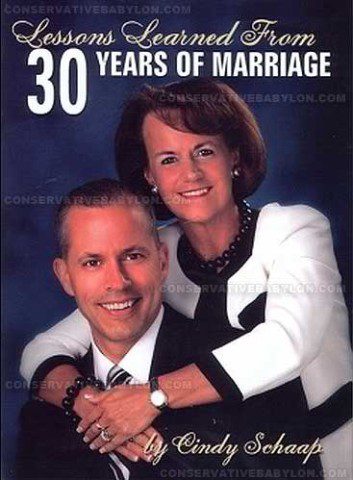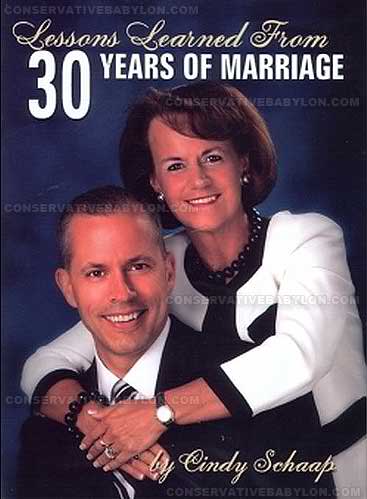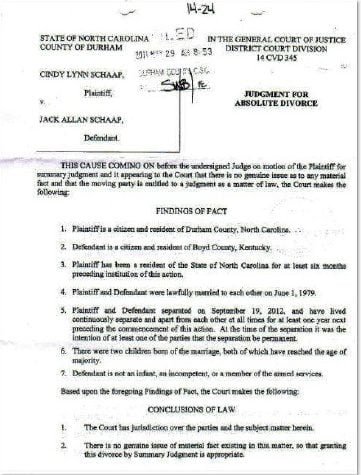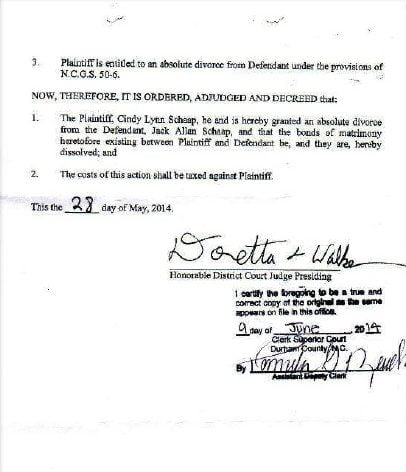
It is common for Independent Fundamentalist Baptist (IFB) preachers and their wives to reach certain milestones in their lives such as longevity of marriage or ministry and then feel “led” by God to write a book about why they were successful.
Jack Schaap took over the helm of First Baptist Church in Hammond, Indiana after the death of IFB luminary Jack Hyles. Schaap’s wife Cindy — the author of the above book — is Hyles’ daughter. In this book, Cindy reveals how and why the Schaaps had a successful marriage. Three years after the book’s publication, Jack Schaap was arrested for taking a minor across state lines to have sex with her. Schaap pleaded guilty and was sentenced to twelve years in federal prison. He was released in May 2022. Cindy divorced Jack, wrote a book titled My Journey to Grace: What I Learned about Jesus in the Dark, and based on available public information is still an Evangelical Christian today. Jack Schaap also wrote a book about marriage titled Marriage: The Divine Intimacy.
Biographical or autobiographical books written by IFB preachers and their wives are almost always an admixture of “ain’t Jesus wonderful?” and fiction. The goal is to give God all the glory and present sanitized, PG-rated tellings of their lives in general, and their marriages in particular. Reality is often far different from what is portrayed in their books.
One Sunday evening in the late 1970s, Polly and I visited Trinity Baptist Church in Findlay, Ohio — an IFB church I attended for forty months as a teenager. After church, the pastor and his wife invited us to their home for refreshments. I had always thought that the pastor and his wife were wonderful people. They had always presented themselves in public as devoted followers of Jesus; a happily married couple. I learned that this was a facade, that things were not as they seemed. Over the next twenty-five years, I would interact with scores of preachers and their wives, learning that there was a big difference between perception and reality; that preachers were not as put-together as they seemed; that their marriages were every bit as challenging, and troubled, as those of the people who looked up to them and called them “pastor.” In other words, they were normal, everyday people, prone to the same frailties as the unwashed masses. The difference, of course, is that these preachers and their wives hid their frailties behind put-together public personas. Spend enough time in the ministry and you learn to play the game.
Polly and I were experts at playing the game. We knew congregants expected us to be winners — victory in Jesus! Church members expected us to have a perfect marriage and well-behaved children. And we gave them exactly what they wanted (needed). However, once in the privacy of our home or automobile, the “real” Bruce and Polly Gerencser came out. There are no deep, dark secrets to be revealed, but both Polly and I were certainly “human.” We had a lot of rough times, especially early in our marriage. After the birth of our second child, Polly gave all of her attention to our two children. In response, I started working sixty-plus hours a week as a general manager for Arthur Treacher’s. Three years into our marriage, we had become busily distant. For a time, both of us wondered if our marriage would survive.
It took us almost thirty years to recognize that we had our priorities wrong; and that putting God/Jesus/Bible/Ministry/Church first was a bad idea. We reprioritized our lives, putting our family and our marriage first. Unfortunately, by the time we were enlightened, our three oldest sons were already adults. While both Polly and I will testify that our marriage is 98.9 percent awesome today, we recognize that there were points in life where we could have destroyed our marriage. Fortunately, we survived and are confident that we will embrace and survive (unless it kills us) what comes our way.
Polly and I have known each other for forty-seven years. Polly was seventeen and I was nineteen when we first met at Midwestern Baptist College. Two years later, we married. By all accounts, we have a “successful” marriage — whatever the hell “successful” means. Over the years, I have had readers ask me to share with them the keys to a successful marriage. Surely, Bruce and Polly Gerencser know what it takes to have a successful marriage, right?
Here’s the truth of the matter: We are lucky that our marriage has lasted forty-five years. Yes, we are committed to one another. Yes, we deeply love one another. Yes, we have built a wonderful life together. Yet, I know couples who had all of these things, but ended up separated or divorced. Married life is a crap shoot. So many variables, so many unknowns. Have you ever played the woulda, coulda, shoulda game? What if I (we) did B instead of A? Would our lives have been different? Maybe, but not necessarily better. I can’t know for sure, so all I know to do is live in the moment, making the best decisions possible on any given day.
Let me conclude this post by giving several pieces of advice; things helped Polly and I as a married couple.
First, don’t let the sun go down on your wrath. Polly and I have fought a time or two over the years. We have had some doozies, often over nothing. Sometimes, we would go to our separate corners for part of a day, but we never sent the other to the couch for the night. We determined to seek forgiveness and make things right between us, never forsaking our shared bed because we were mad.
Second, not only love your spouse but “like” them. Our love was never in question, but it took us years to “like” one another. Now we are best friends. We genuinely enjoy one another’s company.
Third, have your own space; one that is yours alone. Polly and I spend a lot of time together, yet we also have carved out time and space for ourselves, to do the things we want and like to do. Polly and I have completely different reading habits. I read non-fiction, and Polly reads fiction. I used to give Polly a hard time over her book choices, but then I realized she has a right to read whatever she wants. While I may still make a snarky comment now and again over this or that novel Polly is reading, she doesn’t need my approval. And that goes for everything, by the way. As Fundamentalist Christians, we had a patriarchal marriage. I was the final answer to every question — as God ordained. Deconverting forced us to rethink how we wanted our marriage to work. While patriarchal thinking still lurks in the shadows — old habits die hard — we have chosen an egalitarian path; a relationship where each of us has our own space.
Finally, don’t be afraid to turn a critical eye towards your marriage. While most people marry with the intention that their marriages will last “until death do us part,” many marriages fail. Does this mean that these couples were failures? Of course not. Polly and I were naive Independent Baptists with no real-world experience when we married. We had no idea what a “good” marriage looked like. Neither of us would say that what our parents modeled to us was a “good” marriage, especially in my case. My parents divorced when I was fourteen, and remarried several months later. Mom married her first cousin, a recent Texas prison parolee. Dad married a nineteen-year-old girl with a baby; the trophy presenter at the local dirt track. Mom would go on to marry two more times. All I knew was trauma and dysfunction. All Polly knew was emotional distance and secrets. Her parents never argued in public; and never modeled to her how to have a good and happy marriage. We came into marriage ignorant about everything from sex to money. We truly made it up as we went. Fortunately, we kinda, maybe, possibly — hell if I know! — figured it out. Coming to this place required an honest accounting by both of us of not only our personal lives but also of our marital relationship.
Polly and I were lucky that our marriage survived. Many people realize that they married the wrong person or that they are not well-suited. Life is too short to spend it married to the wrong person. Better to get out of the marriage sooner than spending decades persevering, hoping things will change. Sometimes, readers in problem marriages tell me that they wish they had a “successful” marriage like Polly and me. I am quick to deflect, knowing that our success isn’t formulaic; that luck and circumstance had (have) a lot more to do with our success than following certain rules or principles.
For you who have been married for a long time, do you think you have a “successful” marriage? How do you define “success?” What advice would give to a young couple considering marriage? Please share your thoughts in the comment section.
Bruce Gerencser, 68, lives in rural Northwest Ohio with his wife of 47 years. He and his wife have six grown children and sixteen grandchildren. Bruce pastored Evangelical churches for twenty-five years in Ohio, Texas, and Michigan. Bruce left the ministry in 2005, and in 2008 he left Christianity. Bruce is now a humanist and an atheist.
Your comments are welcome and appreciated. All first-time comments are moderated. Please read the commenting rules before commenting.
You can email Bruce via the Contact Form.



